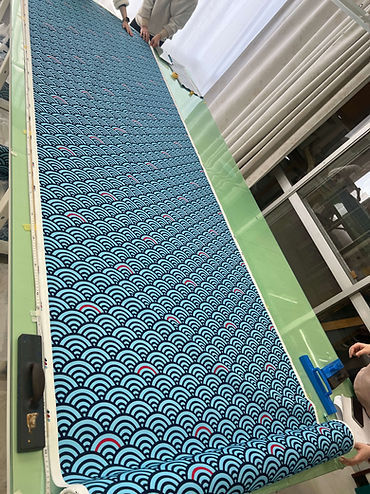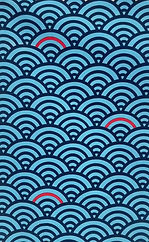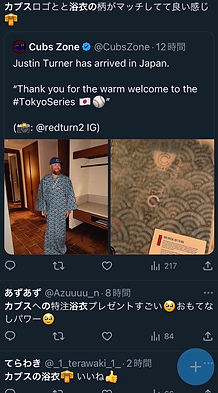
OEM
Wholesale
The brand "Shitateya Jingoro" is not only a retailer, but also a wholesaler and an OEM business. We already have many customers.
Factories in Japan
・Small-lot production
・Minimum delivery time of 4 months is negotiable.
Partner Factories in China
・Mass production support
・Delivery time can be negotiated from 7 months minimum.


Kimono that anyone can easily wear alone.
This kimono has a manufacturing process patented in Japan and the United States.
Create merchandise for sports teams or live events




With the increasing number of Japanese athletes succeeding overseas, more international fans are expressing a desire to support them by wearing traditional Japanese attire such as kimono or yukata while watching sports events.
However, traditional kimono and yukata require expert dressing techniques, making them difficult to put on by oneself. They often require professional cleaning and can become disheveled after being worn for extended periods—making them impractical for casual wear abroad.
"Shitateya Jingoro" kimono, on the other hand, differ from conventional ones. They are designed so that anyone can easily put them on by themselves, making them very popular among international customers who are not familiar with kimono. Additionally, they can be washed at home and maintain their shape even after long hours of wear.
The "Shitateya Jingoro" kimono are made using a unique sewing technique—patented in both Japan and the United States (for versions with collars, without collars, and curved seams)—and are exclusively manufactured by our company. We also produce happi coats, which are commonly known as popular Japanese festival or team support garments.
Case study


MLB
Chicago Cubs
S h i t a t e y a J i n g o r o
✖️ 仕立屋甚五郎
Collaboration Yukata
In preparation for the MLB season opener in Japan, the Chicago Cubs players and their families, who had arrived in Japan, were welcomed with a surprise gift: custom-made yukatas featuring the Chicago Cubs logo, which had been prepared at their hotel.
The Chicago Cubs players arrived in Japan late at night. Despite the long flight, Justin Turner was quick to try on the yukata and posted a photo on Instagram. He said, 'As soon as I saw it, I thought I have to wear this.



Gage Workman
Justin Turner
\Trending in online news and on social media!!/
Made in Japan with attention to detail,
this product is crafted with the spirit of 'omotenashi' (Japanese hospitality).


▲A special logo was also created exclusively for the collaboration yukata between the Chicago Cubs and 'Shitateya Jingoro'

The fabric used is Japanese-made cotton fabric, as requested by the Chicago Cubs. It has a soft feel and excellent durability.

The Seigaiha (wave pattern) is one of Japan's traditional designs. The overlapping wave motif in a fan shape symbolizes gentle harmony and stability, and is considered an auspicious pattern. Additionally, the passionate red accent, inspired by the 'C' of the Chicago Cubs, serves as a bold touch. This design carries the wish: 'May strength rise within us, and may our lives, like the waves, flow smoothly and peacefully into the future without end.
On the left collar, there is an embroidered 'Chicago Cubs' logo (logo provided by the Chicago Cubs). This became a hot topic on online news and social media.
Thanks to the designer's thoughtful arrangement, the design naturally positions the logo on the left front.
In addition, all Kimono and Yukata from Jingo, the kimono tailor, are designed so that anyone can easily wear them by simply tying two straps on the kimono. This makes them easy to wear without making mistakes, and they are especially popular among foreigners. The design is crafted with a patented curved stitching technique, ensuring that the kimono remains perfectly in place without becoming disheveled.

○
the first place

○
The second place

The designer's thoughts behind the pattern
Case study ②


Produced happi coats, bags, T-shirts, and other items as concert merchandise.
Sold as concert merchandise for Ruka Mochizuki, the Japanese enka singer who won the Japan Record Award.


Sell kimono and yukata overseas
Japanese festivals held overseas
Every year, Japanese Bon Odori festivals are held in various countries such as Hawaii, California, and Brazil. In Malaysia, it is said that around 50,000 people participate.
Since traditional yukatas require specialized dressing techniques, most people overseas participate in these festivals wearing regular clothes.
However, with a yukata from Jingo, the kimono tailor, anyone can easily wear it by themselves. The design is patented, ensuring that the yukata won’t come undone no matter how much you dance. The sewing technique, which has patents in both Japan and the United States (for collars, collarless versions, and curved seams), is used exclusively in our "Shitateya Jingoro" yukatas, which can only be made by our company. As a yukata that doesn’t require any special dressing skills, it has become a very popular item among foreigners.





_edited.jpg)
_edited.jpg)




Many foreign tourists who visit Japan purchase kimono and yukata from Shitateya Jingoro, and take them back to their home countries.
"I was able to wear this kimono by myself!"
"It’s machine washable and easy to care for!"
"Perfect as a souvenir!"
Japan-themed festivals held overseas
In recent years, there has been growing interest in Japanese culture overseas. Events such as Japan Fes and anime/manga cosplay events are being held in various places, and we have seen an increase in inquiries from companies wanting to sell kimono, yukata, and kimono robes. However, traditional kimonos require specialized dressing techniques, making it difficult for people to wear them on their own. Additionally, there are challenges such as the cost of dry cleaning and the kimono becoming disheveled after wearing it for long periods, which makes it hard to wear casually overseas.
Unlike traditional kimonos, 'Shitateya Jingoro' kimonos are easy to put on by anyone, even for those who are not familiar with kimono, and they have been very well-received by people overseas. Furthermore, they can be washed at home and will not lose their shape even after wearing them for extended periods.
Using a patented sewing technique (collar, collarless, and curved seams) that has been patented in both Japan and the United States, 'Shitateya Jingoro' kimonos can only be manufactured by our company.

▼Japan Fes in New York





Incorporate them into uniforms for a Japanese restaurant



In recent years, Japanese cuisine has been praised for being 'healthy,' 'beautiful,' and 'unique,' leading to an increasing popularity worldwide. The inclusion of Japanese cuisine in UNESCO's Intangible Cultural Heritage list in 2013 has also contributed to its international recognition. There has been a rise in restaurants offering Japanese food, such as sushi, tempura, wagyu beef, kaiseki, and ramen, around the globe. High-end Japanese restaurants are also gaining attention. Some of these establishments have received great feedback from customers by having their staff wear kimonos, which adds a further touch of Japanese culture. However, traditional kimonos require specialized knowledge for proper dressing, making them difficult to wear by oneself, and they also incur dry cleaning costs. Additionally, wearing them for long periods often leads to them becoming disheveled, which makes it difficult to wear casually overseas.
Unlike traditional kimonos, 'Shitateya Jingoro' kimonos are easy to wear by anyone, even for those who are not familiar with kimono, and they have been very well-received by people overseas. Furthermore, they can be washed at home and will not lose their shape even after wearing them for extended periods.
Using a patented sewing technique (collar, collarless, and curved seams) that has been patented in both Japan and the United States, 'Shitateya Jingoro' kimonos can only be manufactured by our company.
Case study

◀︎Japanese dining restaurant 'JAPANESE DINING Toride'
Additionally, they are also used as uniforms in various establishments such as:
-
High-end sushi restaurants
-
Spas
-
Ryokan (Japanese inns)
and others."
Incorporate Japanese style into our own brand
An Obi woven by Japanese artisans using their skilled techniques, one piece at a time. Why not incorporate traditional techniques and designs that have been passed down through generations into your brand? By integrating Japan's craftsmanship and traditional designs into your products, you can add uniqueness and value, while also contributing to the preservation of Japanese artisan culture.
We would like to propose bags and accessories made from obi fabric.






【Wholesaler Flow】
①Please contact us using the inquiry form.
②A representative will contact you.
③Business negotiation
④Estimate
⑤Order Accepted
⑥Payment
⑦Delivery of products
【OEM Flow】
①Please contact us using the inquiry form.
②A representative will contact you.
③Business negotiation
④Estimate
⑤Order Accepted
⑥Payment
⑦Design and color suggestions and meetings
⑧Determination of color and pattern
⑨Final confirmation
⑩Start of sewing
⑪Inspection
⑫Delivery of products








